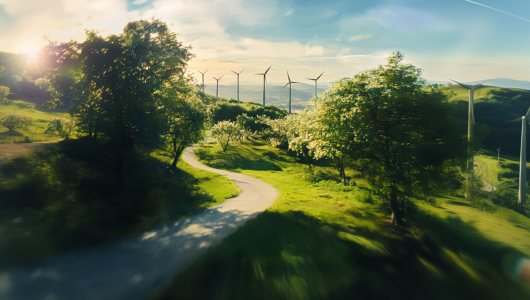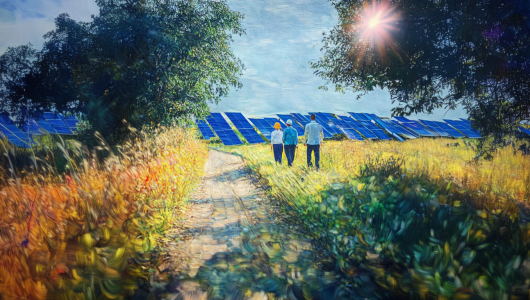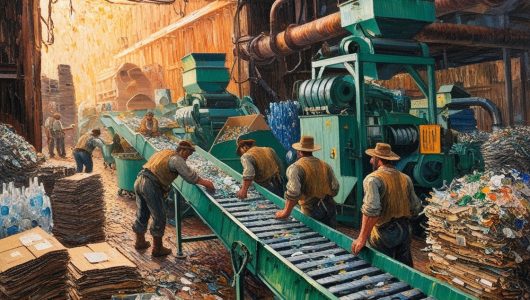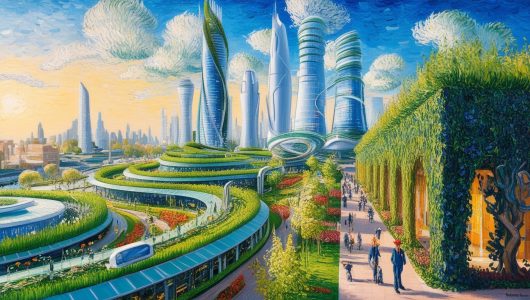Understanding Green Jobs
Ireland is undergoing a transformative shift in its economy, influenced by global climate commitments, EU environmental regulations, and domestic policy initiatives. This evolution is driving the demand for green jobs, spanning renewable energy, waste management, biodiversity conservation, and beyond. In this blog, we will explore the key trends shaping the green job market, the skills in demand, and projections for the future.
Green jobs are roles that contribute to environmental sustainability, including those aimed at reducing carbon emissions, improving resource efficiency, or enhancing biodiversity. These positions exist across sectors, from renewable energy projects and environmental engineering to corporate sustainability and agriculture.

Key Drivers of the Green Job Boom in Ireland
Climate Commitments and Policy Initiatives
Ireland’s pledge to achieve a 51% reduction in greenhouse gas emissions by 2030, as per its Climate Action Plan, has been a major catalyst for green job creation. Policies supporting renewable energy, green infrastructure, and energy efficiency retrofits are generating demand for a wide range of expertise.
For example:
- The Offshore Renewable Energy Development Plan II aims to position Ireland as a leader in offshore wind energy, creating roles in engineering, project management, and marine ecology.
- Government incentives for retrofit projects have spurred growth in construction jobs focused on energy-efficient homes.
Corporate ESG Mandates
This is a huge change that will impact all industries massively in the coming years. Environmental, Social, and Governance (ESG) frameworks are now integral to corporate strategies. Businesses are investing in carbon footprint assessments, climate risk mitigation, and circular economy models, creating roles such as sustainability consultants and ESG analysts, and demand is already outstripping supply.
Technological Advancements
Innovations in renewable energy, carbon capture, and waste processing are reshaping job roles. Ireland’s growing reliance on AI and data analytics for environmental monitoring has opened opportunities for tech-savvy environmental scientists and engineers. This is going to fly! The entire AI sector is already having a much bigger impact than was predicted, and mixing it with the burgeoning green industry means that the right people will be very hard to find.

Sectors Leading the Green Jobs Revolution
Renewable Energy
Ireland’s renewable energy sector is expanding rapidly, aiming for 80% of electricity generation from renewable sources by 2030. Offshore wind, in particular, is a high-growth area, with projects like the Arklow Bank Wind Park set to create thousands of jobs.
In-demand roles:
- Wind turbine technicians
- Marine biologists for ecological impact assessments
- Renewable energy project managers
Construction and Retrofit Industry
The construction industry in Ireland is already buckling, and is amongst the most difficult tranches to recruit within right now, so the impact of retrofits and green building practices, whilst key to meeting Ireland’s sustainability goals, are only going to make a difficult set of circumstances more challenging than ever. Construction professionals are being upskilled to incorporate energy-efficient technologies like solar panels and heat pumps, but it is unlikely that the supply of qualified people will keep up with the demand for them.
In-demand roles:
- Green construction workers
- Energy auditors
- HVAC specialists focused on sustainable systems
Waste Management and Circular Economy
Ireland’s circular economy strategy is driving the transformation of waste management into resource recovery. Businesses are adopting recycling and reuse models, creating jobs in waste logistics, recycling technology, and product lifecycle design. You can see the impact of this happening on the high streets of towns and cities across Ireland.
In-demand roles:
- Recycling plant managers
- Product sustainability specialists
- Circular economy consultants
Biodiversity and Conservation
The EU’s Biodiversity Strategy for 2030 emphasises habitat restoration and species protection. Ireland has seen growth in conservation projects, from rewilding initiatives to urban green spaces.
In-demand roles:
- Conservation ecologists
- GIS analysts for land-use planning
- Environmental educators

Emerging Trends in Green Jobs
Rise of the Circular Economy
The shift from a “take-make-waste” model to a circular economy is fostering roles in product design, waste minimization, and innovative recycling methods. For example, companies are hiring specialists to integrate recycled materials into product lines.
Integration of Technology
Data analytics, AI, and machine learning are increasingly being used for environmental monitoring and resource optimization. This trend is creating hybrid roles requiring both environmental expertise and tech skills.
Green Finance
With increased funding for sustainable projects, green finance is becoming a vital sector. Roles such as sustainable investment analysts and climate risk advisors are on the rise.
Remote Work and Digital Collaboration
The pandemic accelerated remote work adoption, and this trend continues in green jobs. Environmental consultancies and corporate sustainability teams are leveraging digital tools for remote monitoring and reporting and employers who want/need to engage with skilled and talented people in the green sector will have to be flexible and observe these trends.
Challenges Facing the Green Job Market
Skills Gap
Every time the jobs markets has a significant pivot, there is always a delay whilst supply catches up with demand. Always. And because of this, it is inevitable that despite the growing demand for green jobs, Ireland faces a shortage of qualified professionals in areas like renewable energy engineering, carbon accounting, and ecological restoration. Addressing this gap requires targeted education and training programs, but this won’t happen overnight. It might be necessary to look beyond Ireland’s shores, and there are a lot of talented people in the EU and beyond who would find the idea of working here very attractive, but the process of relocating is fraught with issues. Employers may need to find work-arounds here, and offer more assistance with such transitions than they used to.
Economic Pressures
Smaller businesses often struggle to invest in green initiatives due to limited budgets. This economic barrier might slow the pace of green job creation in certain sectors, but with the onus of big business to get their eco ducks in a row, it is unlikely that qualified people won’t remain in great demand.
Policy and Infrastructure Bottlenecks
Delays in planning and permitting for large-scale projects, such as offshore wind farms, can impede job growth. Streamlining these processes is essential for sustaining momentum in green employment and the powers that be need to take this seriously if Ireland is going to continue the momentum towards sustainability.
Remote Work and Digital Collaboration
The pandemic accelerated remote work adoption, and this trend continues in green jobs. Environmental consultancies and corporate sustainability teams are leveraging digital tools for remote monitoring and reporting and employers who want/need to engage with skilled and talented people in the green sector will have to be flexible and observe these trends.

i-Recruit Predictions for the Next Two Years
We’ve done the research and the reading here, and it’s been illuminating. This is what our research suggests:
Renewable Energy
The offshore wind sector will continue to dominate, with an estimated 12,000 jobs created by 2030. Sun-farms are also becoming a political and social hot potato, but it is difficult to predict if they will properly take hold. Hydrogen energy projects may also emerge as a significant area for investment – this is an area that needs to be watched.
Sustainability in Agriculture
Agri-environment schemes will gain importance, driving demand for roles in regenerative farming, soil science, and sustainable forestry. Again, whilst this should start to make a larger and larger impact, it is too soon to understand what the scope of this might be, and the impact on the jobs market.
Increased Corporate Investment in ESG
This is a certainty. As businesses align with stricter EU regulations, roles in sustainability auditing, carbon trading, and corporate reporting will expand. Larger organisations are under increasing pressure to have green, clean credentials, and legislation with give them no choice but to take their responsibilities seriously, or face some very troubling consequences. And this is more than paying lip service, with poorly backed up claims of carbon neutrality, their behaviour will need to change, significantly in many cases.
Educational Expansion
Universities and training institutes are likely to introduce more programs focused on green skills, addressing the current talent shortage and preparing the next generation of environmental professionals, but this will take time, and Ireland may have to look outside the country to find the necessary talent, especially in the next five years or so.
Conclusion: Building a Sustainable Workforce
Ireland’s green job market is at a tipping point, poised for significant growth as the country works toward its ambitious climate goals. For job seekers, this presents a wealth of opportunities to contribute to sustainability while advancing their careers. Employers, on the other hand, must prioritise investment in training and partnerships to bridge the skills gap and drive innovation, as well as being flexible with where it looks for its talent and what it offers prospective employees.
